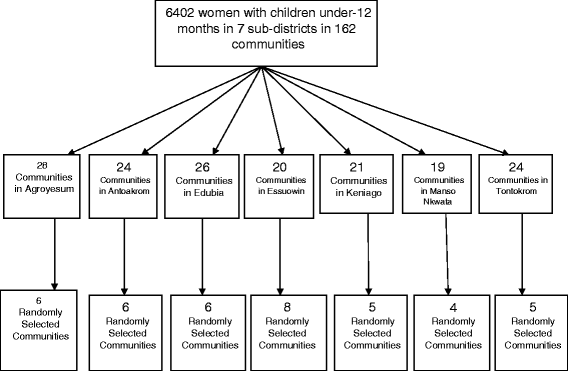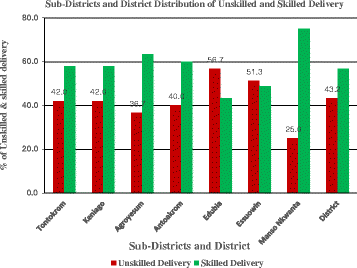Home birth without skilled attendants despite millennium villages project intervention in Ghana: insight from a survey of women's perceptions of skilled obstetric care
- PMID: 26446145
- PMCID: PMC4597447
- DOI: 10.1186/s12884-015-0674-1
Home birth without skilled attendants despite millennium villages project intervention in Ghana: insight from a survey of women's perceptions of skilled obstetric care
Abstract
Background: Skilled birth attendance from a trained health professional during labour and delivery can prevent up to 75% of maternal deaths. However, in low- and middle-income rural communities, lack of basic medical infrastructure and limited number of skilled birth attendants are significant barriers to timely obstetric care. Through analysis of self-reported data, this study aimed to assess the effect of an intervention addressing barriers in access to skilled obstetric care and identified factors associated with the use of unskilled birth attendants during delivery in a rural district of Ghana.
Methods: A cross-sectional survey was conducted from June to August 2012 in the Amansie West District of Ghana among women of reproductive age. Multi-stage, random, and population proportional techniques were used to sample 50 communities and 400 women for data collection. Weighted multivariate logistic regression analysis was used to identify factors associated with place of delivery.
Results: A total of 391 mothers had attended an antenatal care clinic at least once for their most recent birth; 42.3% of them had unskilled deliveries. Reasons reported for the use of unskilled birth attendants during delivery were: insults from health workers (23.5%), unavailability of transport (21.9%), and confidence in traditional birth attendants (17.9%); only 7.4% reported to have had sudden labour. Other factors associated with the use of unskilled birth attendants during delivery included: lack of partner involvement aOR = 0.03 (95% CI; 0.01, 0.06), lack of birth preparedness aOR = 0.05 (95% CI; 0.02, 0.13) and lack of knowledge of the benefits of skilled delivery aOR = 0.37 (95% CI; 0.11, 1.20).
Conclusions: This study demonstrated the importance of provider-client relationship and cultural sensitivity in the efforts to improve skilled obstetric care uptake among rural women in Ghana.
Figures
Similar articles
-
They receive antenatal care in health facilities, yet do not deliver there: predictors of health facility delivery by women in rural Ghana.BMC Pregnancy Childbirth. 2018 May 3;18(1):125. doi: 10.1186/s12884-018-1749-6. BMC Pregnancy Childbirth. 2018. PMID: 29724178 Free PMC article.
-
Losing women along the path to safe motherhood: why is there such a gap between women's use of antenatal care and skilled birth attendance? A mixed methods study in northern Uganda.BMC Pregnancy Childbirth. 2015 Nov 4;15:287. doi: 10.1186/s12884-015-0695-9. BMC Pregnancy Childbirth. 2015. PMID: 26538084 Free PMC article.
-
Birth attendance and magnitude of obstetric complications in Western Kenya: a retrospective case-control study.BMC Pregnancy Childbirth. 2014 Sep 8;14:311. doi: 10.1186/1471-2393-14-311. BMC Pregnancy Childbirth. 2014. PMID: 25201072 Free PMC article.
-
Low utilization of skilled delivery services in rural sub-Saharan Africa: a case for facility delivery improvement.J Public Health Policy. 2025 Mar;46(1):211-221. doi: 10.1057/s41271-024-00542-w. Epub 2024 Dec 14. J Public Health Policy. 2025. PMID: 39674820 Review.
-
A scoping review of the residual barriers to skilled birth attendance in Ghana: A conceptual framework and a fish bone analysis.PLOS Glob Public Health. 2024 Feb 12;4(2):e0002902. doi: 10.1371/journal.pgph.0002902. eCollection 2024. PLOS Glob Public Health. 2024. PMID: 38346065 Free PMC article.
Cited by
-
Why do patients refuse trichiasis surgery? Lessons and an education initiative from Mtwara Region, Tanzania.PLoS Negl Trop Dis. 2018 Jun 14;12(6):e0006464. doi: 10.1371/journal.pntd.0006464. eCollection 2018 Jun. PLoS Negl Trop Dis. 2018. PMID: 29902219 Free PMC article.
-
Factors influencing the free maternal health care policy under the national health insurance scheme's provision for skilled delivery services in Ghana: a narrative literature review.BMC Pregnancy Childbirth. 2023 Jun 14;23(1):439. doi: 10.1186/s12884-023-05730-2. BMC Pregnancy Childbirth. 2023. PMID: 37316790 Free PMC article. Review.
-
Why not? Understanding the spatial clustering of private facility-based delivery and financial reasons for homebirths in Nigeria.BMC Health Serv Res. 2018 Jun 1;18(1):397. doi: 10.1186/s12913-018-3225-4. BMC Health Serv Res. 2018. PMID: 29859092 Free PMC article.
-
Inequality trends in maternal health services for young Ghanaian women with childbirth history between 2003 and 2014.BMJ Open. 2017 Feb 7;7(2):e011663. doi: 10.1136/bmjopen-2016-011663. BMJ Open. 2017. PMID: 28174219 Free PMC article.
-
Preference of homebirth and associated factors among pregnant women in Arba Minch health and demographic surveillance site, Southern Ethiopia.PLoS One. 2022 Oct 27;17(10):e0276682. doi: 10.1371/journal.pone.0276682. eCollection 2022. PLoS One. 2022. PMID: 36301942 Free PMC article.
References
-
- Ghana Health Service (GHS) 2011 Annual Report. Accra, Ghana: Ghana Health Service; 2011.
-
- Service, GS . Multiple Indicator Cluster Survey with an enhanced Malaria Module and Biomarker 2011, Final Report. Accra, Ghana: Ghana Statistical Service; 2011.
Publication types
MeSH terms
LinkOut - more resources
Full Text Sources
Other Literature Sources
Medical



